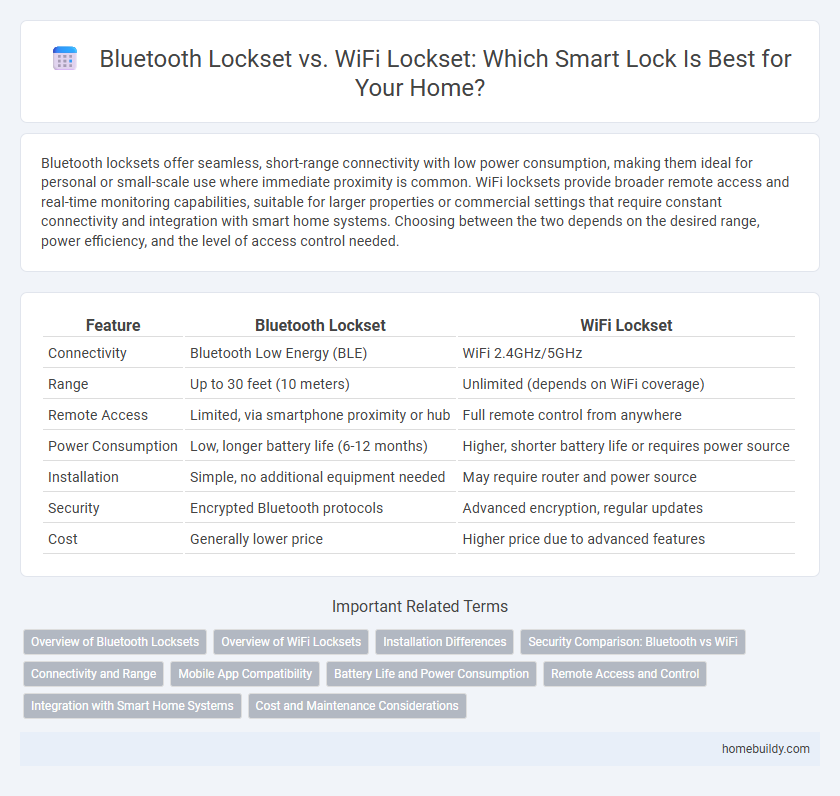Bluetooth locksets offer seamless, short-range connectivity with low power consumption, making them ideal for personal or small-scale use where immediate proximity is common. WiFi locksets provide broader remote access and real-time monitoring capabilities, suitable for larger properties or commercial settings that require constant connectivity and integration with smart home systems. Choosing between the two depends on the desired range, power efficiency, and the level of access control needed.
Table of Comparison
| Feature | Bluetooth Lockset | WiFi Lockset |
|---|---|---|
| Connectivity | Bluetooth Low Energy (BLE) | WiFi 2.4GHz/5GHz |
| Range | Up to 30 feet (10 meters) | Unlimited (depends on WiFi coverage) |
| Remote Access | Limited, via smartphone proximity or hub | Full remote control from anywhere |
| Power Consumption | Low, longer battery life (6-12 months) | Higher, shorter battery life or requires power source |
| Installation | Simple, no additional equipment needed | May require router and power source |
| Security | Encrypted Bluetooth protocols | Advanced encryption, regular updates |
| Cost | Generally lower price | Higher price due to advanced features |
Overview of Bluetooth Locksets
Bluetooth locksets offer secure, wireless access control through short-range communication, enabling seamless smartphone connectivity without relying on internet access. These locksets feature energy-efficient protocols and typically provide faster response times compared to WiFi locksets. Ideal for residential and small commercial applications, Bluetooth locksets prioritize convenience and privacy by limiting access control within a close proximity environment.
Overview of WiFi Locksets
WiFi locksets provide seamless remote access and management through direct internet connectivity, enabling users to control and monitor entry from anywhere without relying on a hub or bridge. These locksets often include real-time alerts, activity logs, and integration with smart home systems via dedicated apps, offering enhanced convenience and security. While WiFi locksets typically consume more power than Bluetooth counterparts, their extended range and constant connectivity suit users seeking comprehensive, always-on control over their smart locks.
Installation Differences
Bluetooth locksets typically require minimal installation effort, often connecting directly to a smartphone within close proximity without the need for additional network configuration. WiFi locksets involve a more complex setup, requiring integration with the home's wireless router, which can demand advanced network knowledge and longer installation times. The Bluetooth lockset's straightforward, device-to-lock pairing contrasts with the WiFi lockset's dependency on stable internet signals and router compatibility.
Security Comparison: Bluetooth vs WiFi
Bluetooth locksets typically offer enhanced security through short-range communication, reducing the risk of remote hacking compared to WiFi locksets that rely on internet connectivity and are more susceptible to cyberattacks. Bluetooth locksets use encryption protocols like AES-128 to secure the pairing process, whereas WiFi locksets often depend on home network security, which can vary widely in robustness. The limited range of Bluetooth minimizes exposure to unauthorized access attempts, while WiFi locksets, despite offering remote access convenience, require stringent password protection and regular firmware updates to mitigate vulnerabilities.
Connectivity and Range
Bluetooth locksets offer direct device-to-lock communication with a typical range of up to 30 feet, ideal for close-proximity access control without relying on internet connectivity. WiFi locksets connect through a home or office network, providing remote access and control from virtually anywhere with internet service, extending usability beyond the lock's immediate vicinity. Bluetooth locksets prioritize low power consumption and instant access, whereas WiFi locksets emphasize extended range and real-time monitoring capabilities.
Mobile App Compatibility
Bluetooth locksets offer seamless mobile app compatibility with direct device-to-lock communication, ensuring faster response times and offline access without the need for internet connectivity. WiFi locksets require a stable internet connection for app control, enabling remote access and real-time notifications from anywhere but relying heavily on network stability. Both lock types support Android and iOS apps, with Bluetooth models excelling in battery efficiency and WiFi models providing enhanced remote management features.
Battery Life and Power Consumption
Bluetooth locksets typically offer longer battery life due to their low energy consumption and ability to maintain connections with minimal power. WiFi locksets, while providing remote access and broader connectivity, generally consume more power, leading to shorter battery life and more frequent recharging or battery replacements. Optimizing battery management in Bluetooth locksets enhances energy efficiency, making them ideal for users prioritizing extended usage without frequent maintenance.
Remote Access and Control
Bluetooth locksets offer secure and efficient remote access through paired smartphones within close proximity, ideal for personal use in homes and small offices. WiFi locksets enable seamless remote control from anywhere with internet connectivity, providing real-time monitoring and management via mobile apps. WiFi locksets are preferred for enhanced remote accessibility and integration with smart home systems requiring constant connectivity.
Integration with Smart Home Systems
Bluetooth locksets offer seamless integration with smartphones and local smart home systems through direct device pairing, enhancing security with proximity-based access control. WiFi locksets provide broader connectivity, enabling remote access and real-time notifications via cloud platforms compatible with major smart home ecosystems like Alexa, Google Home, and Apple HomeKit. Choosing between Bluetooth and WiFi locksets depends on the need for local control versus extensive remote management and integration capabilities.
Cost and Maintenance Considerations
Bluetooth locksets typically incur lower upfront costs and require minimal maintenance due to their limited range and direct device connectivity, reducing dependency on network infrastructure. In contrast, WiFi locksets often have higher initial expenses and ongoing maintenance demands, including firmware updates and potential network troubleshooting, given their reliance on continuous internet connectivity. Evaluating these factors helps determine the best lockset option based on budget constraints and infrastructure support.
Bluetooth Lockset vs WiFi Lockset Infographic

 homebuildy.com
homebuildy.com